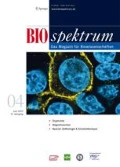Abstract
Depending on conditions and tumor stage, the transforming growth factor β (TGFβ) can act either as tumor suppressor or as tumor promoter. One process by which TGFβ contributes to metastatic events is the epithelial to mesenchymal transition (EMT). This process results in de - differentiation of tumor cells, gain of migratory capability and increase of tumor cell survival in particular of detached tumor cells. In the last years multiple mechanisms have been described by which TGFβ mediates EMT in a variety of tumor entities.
Similar content being viewed by others
References
Thiery JP, Acloque H, Huang RYJ et al. (2009) EMTs in development and disease. Cell 139:871–890
Zhang YE (2018) Mechanistic insight into contextual TGF-ß signaling. Curr Opin Cell Biol 51:1–7
Suzuki H (2018) MicroRNA control of TGF-ß signaling. Int J Mol Sci 19:1901–1910
Heldin CH, Moustakas A (2016) Signaling receptors for TGF-ß family members. Cold Spring Harb Perspect Biol 8, doi: 10.1101/cshperspect.a022053
Hill CS (2016) Transcriptional control by the SMADs. Cold Spring Harb Perspect Biol 8, doi: 10.1101/cshperspect.a022079
Imamichi Y, Waidmann O, Giehl K et al. (2005) TGF betainduced focal complex formation in epithelial cells is mediated by activated ERK and JNK MAP kinases and is independent of Smad4. Biol Chem 386:225–236
Giehl K, Imamichi K, Menke A (2007) Smad4-independent TGF-beta signaling in tumor cell migration. Cells Tissues Organs 185:123–130
Shirakihara T, Saitoh M, Miyazono K et al. (2007) Differential regulation of epithelial and mesenchymal markers by dEF1 proteins in epithelial–mesenchymal transition induced by TGF-ß. Mol Biol Cell 18:3533–3544
Mu Y, Gudey SK, Landström M (2012) Non-Smad signaling pathways. Cell Tissue Res 347:11–20
Witte D, Otterbein H, Giehl K et al. (2017) Negative regulation of TGF-ß1-induced MKK6-p38 and MEK-ERK signalling and epithelial-mesenchymal transition by Rac1b. Sci Rep 7:17313–17318
Nuessle JM, Giehl K, Menke et al. (2011) TGFbeta1 suppresses vascular smooth muscle cell motility by expression of N-cadherin. Biol Chem 392:461–474
Ungefroren H, Sebens S, Giehl K et al. (2014) Rac1b negatively regulates TGF-ß1-induced cell motility in pancreatic ductal epithelial cells by suppressing Smad signaling. Oncotarget 5:277–290
Author information
Authors and Affiliations
Corresponding authors
Additional information
Klaudia Giehl 1986–1992 Biologiestudium an der Universität Bielefeld. 1995 Promotion am Institut für Zellbiologie, TU Braunschweig. 1995–2010 wißsenschaftliche Mitarbeiterin/ Assistentin am Institut für Pharmakologie und Toxikologie und der Klinik für Innere Medizin I der Universität Ulm. 2000 Forschungsaufenthalt am University College London, UK. 2004 Habilitation. 2010–2014 Gruppenleiterin an der Universität Gieβen, dort seit 2014 Professur für Signaltransduktion zellulärer Motilität. Mitglied des Vorstandes der Gesellschaft für Signaltransduktion (STS) und des Beirats der Gesellschaft für Bio chemie und Molekularbiologie (GBM).
Andre Menke 1984–1990 Biologiestudium an den Universitäten Kiel und Bielefeld. 1994 Promotion im FB Biologie der Universität Bielefeld. 1994–2009 Postdoc und Arbeitsgruppenleiter in der Klinik für Innere Medizin I der Universität Ulm. Seit 2010 Professor für Molekulare Onkologie solider Tumore der Universität Gieüen.
Rights and permissions
About this article
Cite this article
Menke, A., Giehl, K. TGFβ in der Entwicklung und Metastasierung von Karzinomen. Biospektrum 24, 590–592 (2018). https://doi.org/10.1007/s12268-018-0962-1
Published:
Issue Date:
DOI: https://doi.org/10.1007/s12268-018-0962-1




